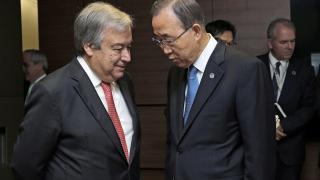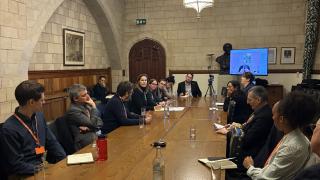
The House of Lords International Relations Committee has published its report on UK priorities for the next Secretary-General. The report incorporates UNA-UK's recommendations on areas of UN leadership, peacekeeping and institutional reform, as well as the central role the UK should play in driving forward these changes.
The report, published on 3 November, is the culmination of an inquiry carried out by the Lords' International Relations Committee. UNA-UK's Executive Director, Natalie Samarasinghe, was among those invited to submit evidence, and UNA-UK is pleased that her insight has been taken on board by the Committee in the form of their recommendations to the UK Government.
Read Natalie Samarasinghe's submission
The UN remains more than ever an essential global institution and a lynchpin of a rules-based international order
In the face of an increasingly turbulent and uncertain world, the report opens with a reminder of the crucial role the UN continues to play as the holder of a "unique legitimacy", without which international agreements such as those on climate change and sustainable development would not be possible.
Yet amidst greater tensions between powerful states and geopolitical shifts, the UN's future is not guaranteed. The report acknowledges that now more than ever, the UK, other UN member states and the new Secretary-General must seek to strengthen and support the institution in order for it to be capable of tackling the challenges ahead.
A new injection of organisational vigour and leadership is needed to meet these formidable challenges.
The report highlights the need for the incoming Secretary-General, Antonio Guterres, to lead on much greater cooperation between the UN and regional organisations, and the importance of increased UN engagement with civil society. The UK has the potential to play an important role by supporting a review into communications between the UN and more disenfranchised communities and smaller organisations.
The report goes on to praise the transparency and inclusivity of the recent Secretary-General selection process, advocated by UNA-UK’s 1 for 7 Billion campaign, and emphasises the need to ensure the progress is permanent. It also considers the merits of a single seven-year term for the UN chief, one of the major campaign proposals of 1 for 7 Billion.
On the subject of UN leadership, the report considers that the UN should build on the momentum of the Secretary-General’s appointment by injecting more transparency and accountability into senior UN appointments. It advocates for a more meritocratic selection process for leadership positions within UN agencies:
We urge the UK to propose a more rigorous and competitive selection process for the leadership positions of UN agencies. Member states, including the UK, should agree the criteria, seek expressions of interest, put forward more than one candidate and finally, set performance expectations.
The report also notes that rigorous appointment processes for leadership roles within UN peackeeping missions are critical. Any misconduct equals a loss of integrity both within the peacekeeping missions and for the Organisation as a whole. Measures such as pre-deployment training and greater accountability over issues such as sexual exploitation and abuse are considered essential:
Tackling sexual abuse and exploitation by UN peacekeepers must be a priority for the incoming Secretary-General.
The report emphasises that the support and initiative of member states is a requisite to bringing about effective UN reform. Given the UK's expected departure from the EU, it is more important than ever for the UK to reaffirm its leadership at the United Nations by driving forward proposals to reform and strengthen the Organisation.






